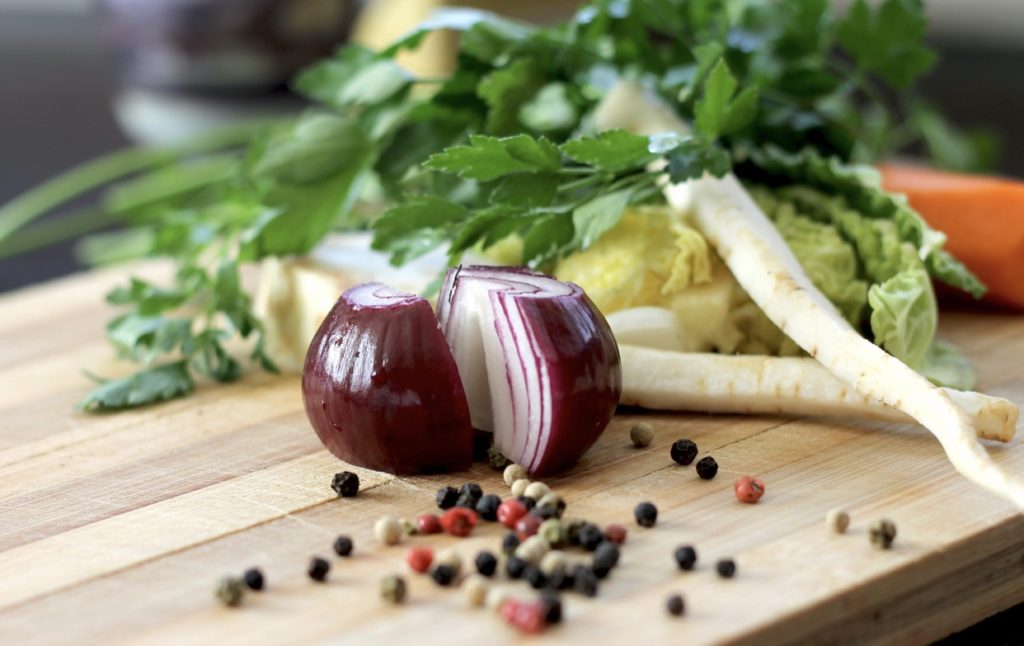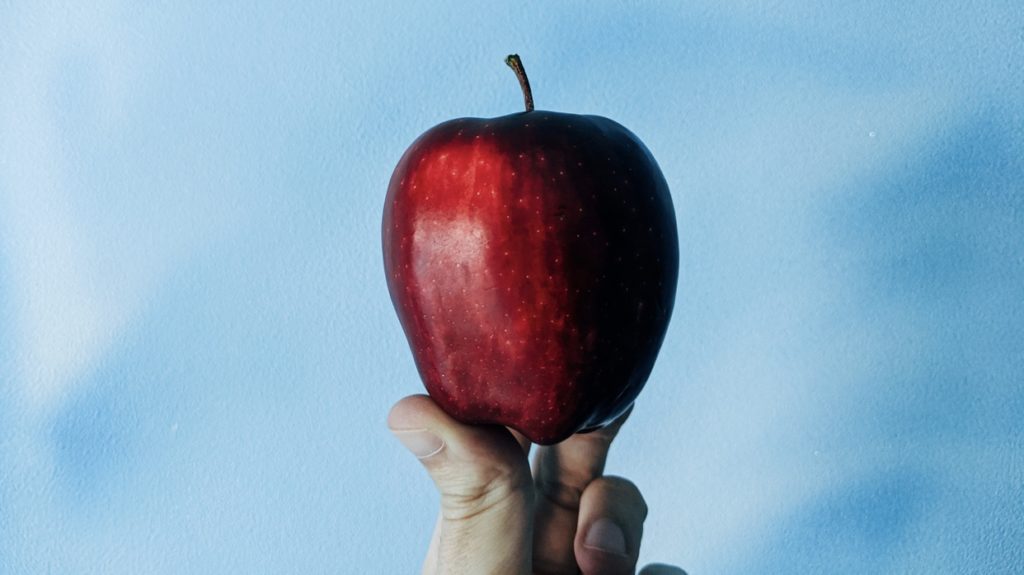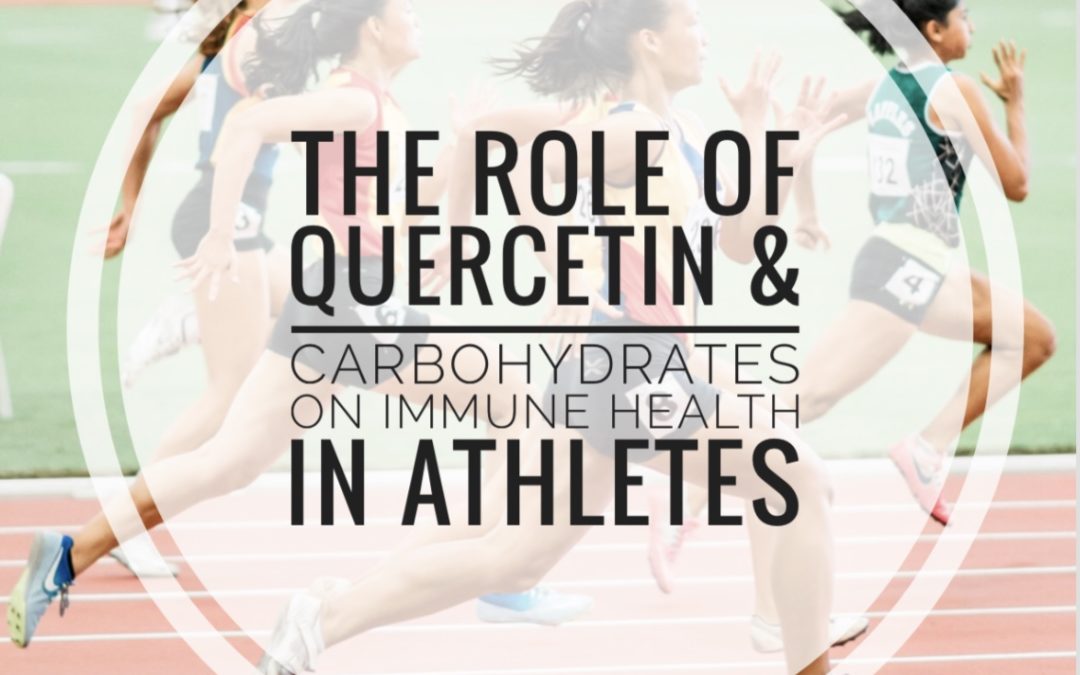Many nutrients support immune health and recovery in athletes, but recent research has looked at the role of carbohydrates and quercetin on immune health. Here’s what the research shows and how to incorporate them into your training plan.

Immune health is a hot topic, especially when it comes to athletes that play competitive sports. The continuous and consistent training that serious athletes endure puts a burden on their immune system – especially if their diet isn’t up to par. The combination of overtraining and inadequate recovery makes it difficult for the immune system to function at 100%. Athletes have to train hard, and their sports nutrition plan should support that training. That includes nutrients that support immune health.
How Intense Workouts Impact Immune Health
During intense and prolonged workouts, your body’s stress response rises. As you run your sprints, make cuts, or you struggle to lift that extra rep, your muscles are actually tearing. After your exercise session, your body begins working to repair your muscles. Part of the repair process includes growing new muscle tissue. That breakdown, repair and rebuild cycle is the normal and necessary process of muscle growth.
During the mending period, however, your body releases signals as if it’s wounded. At the same time, your cells involved in immune health become temporarily suppressed. This is known as the “open window,” and described as the 3-12 hours after prolonged endurance activity. That’s the time period when the host defense is down and the risk of developing upper respiratory tract infections is elevated.
If you’re not properly recovering from your workouts, your body takes longer to recover and can remain in patchwork mode. Certain athletes can also be at increased risk of infections. To be your best, give your body the rest it needs to help you win the battle, and include immune supporting nutrients in your daily sports nutrition plan.
The Role Of Carbohydrates And Quercetin For Immune Support
Following an intense training plan helps you gain a competitive edge. The purpose of your sports nutrition plan, is to support that training. It provides the extra foods and fluids needed to train hard, and should be adjusted as your training plan changes.
Supplying your body with the right nutrients supports your immune health and can help speed-up your recovery time, allowing you to get back in the gym, for more quality training.
Many nutrients play a role in immune health, but both carbohydrates and quercetin that have been getting attention, recently. Here’s how they may play a role in supporting your immune health.
Carbohydrates
Carbohydrates are at the foundation of an athlete’s sports nutrition plan. They provide the energy needed to train and recovery. What many athletes don’t realize, though, is the important role they play in supporting immune health.
Research shows that carbohydrate supplementation is effective at minimizing immune disturbances during exercise recovery. While they don’t influence all aspects of the immune system, they do play a role.
Consuming the extra carbohydrates needed before, during, and after intense exercise training is a huge part of your overall carbohydrate intake. But, it’s not the only time they are needed. Eating carbohydrates throughout the day is equally important. That means breakfast, lunch, dinner and snacks.

Quercetin
Quercetin is a flavanol that’s been getting some serious attention in the sports nutrition world. It’s mostly recognized for its strong antioxidant activity. Recent research, however, has been investigating quercetin’s potential role in immune response, exercise performance and recovery. For this post, I’m going to focus on its potential role on illness and immune health.
Upper respiratory infections is one illness that tends to get a lot of attention in athletes. That’s because, epidemiological data shows that endurance athletes are at higher risk for developing one during periods of heavy training. That includes the weeks after running long-distance events. The increase risk is one reasons why athletes have a higher vitamin C need than non-athletes. Vitamin C works as a powerful antioxidant to fight the free radical damage from intense training.
But, what about quercetin?
Many studies have investigated the effect of quercetin on immune health, but most are not focused on athletes. Instead, much of the research is studying its potential role in auto-immune disorders and its potential anti-allergy effects. One study, however, did look at the effects quercetin supplementation may have on the incidence of upper respiratory tract infections (URTI) and the exercise-induced changes in immune function that occur after training. The study split a group of 40 trained male cyclists into two groups. Twenty of the cyclists received a quercetin supplement, and the other twenty got a placebo. The results showed that quercetin didn’t alter the exercise-induced changes in several measures of immune function. It did, however, significantly reduced the incidence of upper respiratory tract infections in the two week period following intense exercise.
We can’t say for sure that quercetin will support your immune system, but its antioxidant properties can support the intense training of athletes.

Food Sources Of Quercetin
Quercetin is found naturally in many foods. And, carbohydrates and quercetin are found in many of the same foods. Research estimates that the average person consumers between 10-100 mg of it daily through their typical diet.
The following are some common food sources of quercetin:
- Onions (includes spring onions & scallions)
- Apples (especially the skins of red varieties)
- Peppers (the hotter, the better)
- Berries (especially cranberries, blueberries and raspberries)
- Cherries
- Green vegetables (kale, spinach, cooked asparagus, green peas)
- Green Tea
- Red Wine
- Capers
Quercetin Supplements
Quercetin supplements are commonly sold as 500 mg tablets, though, there is no set recommendation for how much you should take in a day. That’s because, there’s simply not enough scientific evidence to make a recommendation.
In the study above, the cyclists in the quercetin group received 1,000 mg/day. Honestly, it’s nearly impossible to eat enough natural sources of quercetin in your diet to reach 1,000 mg (imagine nearly a pound of capers or four pounds of cilantro leaves). However, it still wouldn’t hurt to keep quercetin-rich foods in your everyday diet, since these foods are healthful in so many other ways, too.

Immune Support For Everyone
Keep in mind that the focus of this article was to discuss the role of carbohydrates and quercetin for athletes. Moderate physical exercise doesn’t typically put your body in a state of physical stress, like higher level training does. Your body is typically able to maintain normal immune function with a well-balanced and healthy diet.
That’s not to say all active people won’t benefit from a carbohydrate and quercetin rich diet. Both have a lot to offer in terms of nutrition, so be sure to eat a diet rich in fruits and vegetables.


 Hi, I’m Heather – a registered dietitian, busy mom, consultant, adventure junkie and travel addict who has mastered living healthy on the go. My blog is where I share simple recipes and healthy living tips to help and inspire others to live their best life.
Hi, I’m Heather – a registered dietitian, busy mom, consultant, adventure junkie and travel addict who has mastered living healthy on the go. My blog is where I share simple recipes and healthy living tips to help and inspire others to live their best life.